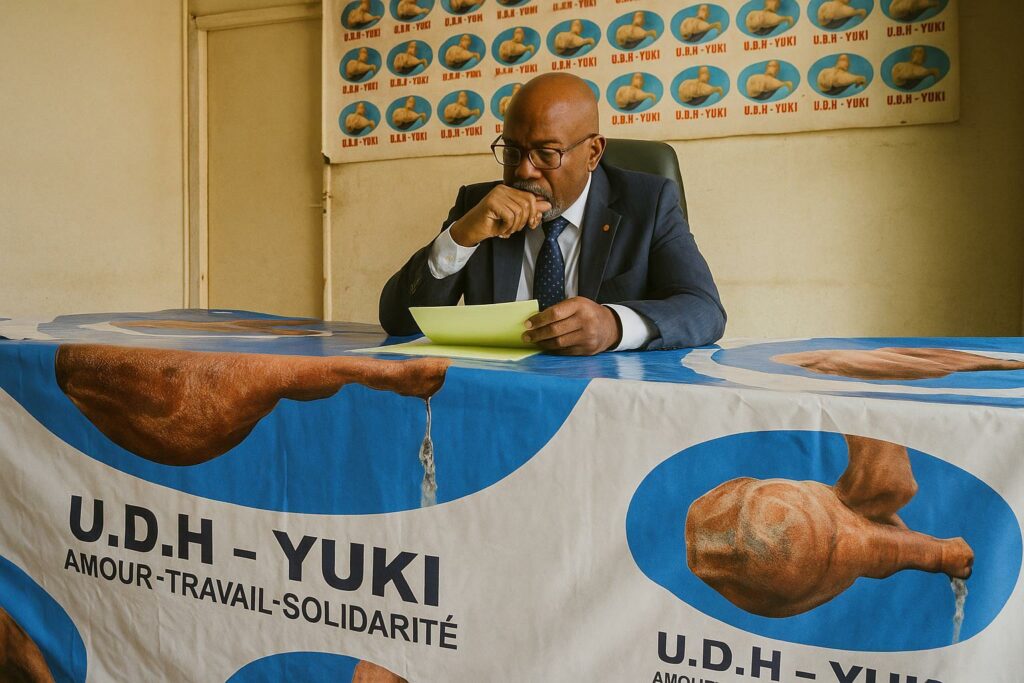A swift purge meant to restore cohesion
In a communiqué released in Brazzaville on 17 August 2025, the Union of Humanist Democrats-Yuki (UDH-Yuki) announced the immediate expulsion of deputy Gérald Lone Bambi Goma, departmental councillor Massengo Sylvain and political bureau member Gilles Fernand Bassindikila. Party president Joseph Badiabio signed the decision following an extraordinary meeting of the political bureau that, according to participants, lasted less than two hours but reviewed months of written grievances and testimonies (party communiqué, 17 August 2025).
The UDH-Yuki insists that the three cadres repeatedly violated the organisation’s statutes, ignored earlier suspensions imposed in April 2024 and openly challenged internal authority. Far from framing the decision as punitive alone, Mr Badiabio described it as “a step toward safeguarding the moral integrity of our movement so that we can continue to serve the Republic with clarity and loyalty.” His words echoed through national radio and were rapidly relayed by regional press agencies, underscoring the strategic importance the party attributes to internal discipline.
Legal anchors and parliamentary arithmetic
By stripping the trio of the right to use the party’s name, emblem or resources, UDH-Yuki invoked provisions contained both in its internal regulations and in the Congolese Law on Political Parties, which allows organisations to defend their intellectual and symbolic property before civil courts. The communiqué warns that any misappropriation will prompt judicial action, a clause that mirrors article 14 of the 2022 Political Parties Compliance Act. Local jurists contacted in Brazzaville view the threat as credible, noting precedents in which dissident factions were ordered to cease using party colours within ten days of a court ruling.
Inside the National Assembly, the expulsions demanded swift reorganisation. Sylvain Samba, vice-president of the UDH-Yuki parliamentary group, has been appointed interim leader until the caucus is formally recomposed under article 64 of the Assembly’s Standing Orders. The chamber now counts one fewer officially recognised opposition member, lowering UDH-Yuki’s voting weight on committee assignments. While the governing majority remains numerically unchallenged, the reconfiguration could affect ad-hoc coalitions on specialised oversight panels dealing with infrastructure and public accounts, areas in which the expelled deputy Bambi Goma was particularly active.
Signals to the base amid competitive politics
Beyond juridical justifications, the expulsions carry a clear psychological message to rank-and-file militants. Over recent months, some grassroots sections had complained of what they called “ideological drift” by certain officeholders, especially in Brazzaville’s southern arrondissements. By acting decisively, the national leadership aims to reassure supporters that fidelity, transparency and solidarity—the trio of values printed on the party’s emblem—are not mere slogans. Interviews with neighbourhood coordinators in Makélékélé suggest that sympathisers have welcomed the firmness, hoping it will translate into more coherent field work ahead of municipal consultations projected for mid-2026.
Political scientists at Marien-Ngouabi University argue that Congolese parties, whether in government or in opposition, increasingly resort to strict internal governance to maintain relevance in an information age characterised by fast news cycles and social-media scrutiny. In that sense, UDH-Yuki is following a continental trend of codifying loyalty to prevent fragmentation reminiscent of the early 2000s.
Regional echoes and diplomatic observation
The decision did not go unnoticed among Congo-Brazzaville’s multilateral partners. Diplomats from the Economic Community of Central African States (ECCAS) acknowledged the expulsions as an “internal matter,” yet underlined in private their interest in stable and predictable opposition interlocutors for ongoing talks on regional infrastructure corridors. A senior French envoy, speaking off the record, noted that disciplined party structures can strengthen parliamentary diplomacy, provided that due process is observed.
Observers in Yaoundé and Libreville recall that similar party restructurings in neighbouring Cameroon and Gabon occasionally led to protracted legal battles. In comparison, UDH-Yuki’s explicit recourse to its own rules and national legislation may shorten potential litigation, offering a case study in conflict management within political organisations in Central Africa.
Governance, economy and the road ahead
While the expulsions have no immediate macroeconomic impact, they interact subtly with the Republic’s broader governance agenda. Congo-Brazzaville continues to implement public-finance reforms supported by international partners, and cohesive parliamentary blocs—majority or opposition—are instrumental to scrutinising budget execution. By consolidating its ranks, UDH-Yuki reinforces its ability to contribute constructively to legislative debates on debt sustainability, hydrocarbons regulation and the diversification targets set out in the National Development Plan 2022-2026.
For the presidency and the executive, a disciplined opposition may reduce procedural deadlock and enhance the image of a maturing political system before rating agencies and prospective investors. A commentator from the African Development Bank’s Brazzaville office remarked that “predictable legislative behaviour, even from critics of the government, is a positive governance indicator.” In that sense, the party’s internal house-cleaning aligns, perhaps inadvertently, with the national interest in institutional stability.
An inflection, not an endgame
UDH-Yuki’s leadership has made clear that the door remains open to reconciliation, provided the expelled members acknowledge past mistakes and request readmission under the rules. For now, however, the trio’s exclusion stands as a watershed moment, signalling to other opposition actors the costs of internal dissent left unchecked. The measure also illustrates how Congolese political parties are refining their internal compliance mechanisms, a development that could, over time, strengthen parliamentary oversight and democratic debate to the benefit of citizens.

